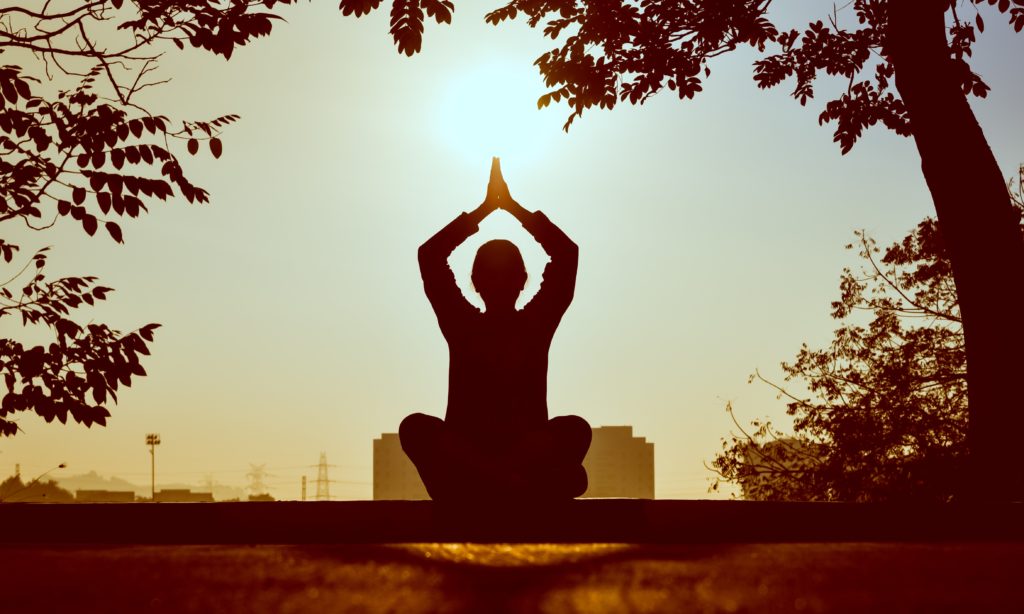Simply put, self-esteem is how we value ourselves. It’s more particularly the stories we tell ourselves about the types of people we are. We have good self-esteem if our opinions about ourselves are typically favourable. If our ideas about ourselves are frequently negative, we, like many others, may have poor self-esteem. The good news is that meditation may help us modify our connection with our thoughts, ultimately enhancing our self-esteem and confidence. Hence one must practise meditation to build their self-esteem.

Table of Contents
What exactly is self-esteem?
What exactly is self-esteem? Self-esteem refers to how we see and appreciate ourselves. A frail sense of self swings from day to day or from moment to moment. It is impacted by both positive and bad experiences that are either delivered outside (for example, when we are congratulated or belittled by a coworker) or created inwardly (when we reflect on our performance after a presentation). A solid sense of self, on the other hand, will seldom, if ever, shift.
True self-esteem, on the other hand, is the capacity to let go of old tales and expose ourselves to the vulnerability and uncertainty that come with not having those safe stories to fall back on. When we acknowledge that our ideas and feelings aren’t the entirety of who we are, we get access to a calm, serene assurance that isn’t influenced by our internal or external surroundings.

It’s easy to believe that our self-esteem is influenced by previous occurrences and is dependent on future ones. Rather, self-esteem occurs in the present moment and stems from a calm mind that no longer identifies so deeply with fleeting ideas and sensations and instead recognizes them for what they are: fleeting. So, how can we begin to break free from the grip that our ideas and feelings have on us? Of course, the answer is meditation.
The Significance of Strong Self-Worth/ Self Esteem
When a person exhibits poor self-esteem, they prefer to avoid anxiety-inducing circumstances. These are occasions in which people fear they will be embarrassed or fail. There are many other signs of low self-esteem that goes unnoticed.
Naturally, these scenarios might entail education, a job, and the development of personal relationships, all of which are significant in a person’s life.

Millions of individuals throughout the world are currently dealing with low self-esteem. The most susceptible demographic is young adults and teens.
How Does Mediation For Self-Esteem Help?
There are many ways to boost self-esteem and meditation is one of them. Consider the mind to be a blank canvas on which thoughts, feelings, and experiences emerge. Calmness, brightness, clarity, and contentment are the fundamental essences of the mind. When the mind is overburdened with negative ideas, it becomes overcast, dark, and even stormy. We get overwhelmed by these ideas, associating with them in ways that undermine our confidence and self-worth.
That is why meditation can be such a potent and transforming tool for increasing self-esteem. We know that no matter how clouded the sky grows, there will always be a blue sky on the other side. The mind is the same way: no matter how busy it looks, we know there is always an underlying sense of serenity and peaceful assurance – if we can only stop long enough for it to show. The calm mind, like the blue sky, is constantly there and available to us. Meditation teaches us how to go to this realm of vast clarity.

This is how it works: Consider having a thought that says, “I’m no good,” thinking it to be true and serious, and then having it effect how you feel about yourself. We have ideas during meditation, but we can recognize them as fleeting. We just let things go, rather than connecting with them or utilizing them to reaffirm an old tale in our heads. The more we practice, the simpler it is to move beyond thinking, which means paying less attention to ideas and not letting them define who we are. We may encounter the mind’s innate nature, which is tranquil, confident, and ever-present.
Use Positive Affirmations during Meditation for Self Esteem
The following approach is proposed by Russ Harriss. When you have negative ideas like “I’m not clever enough” or “I’m unattractive,” consider them from a different angle.
Rep to that notion by inserting the following word in front of it. “I’m having the notion…”
Replay the same notion a second time. Add “I noticed” this time. ‘I observed I am having the thinking that I am not smart enough,’ for example. This will have a huge impact.

Take it a step farther when you get the opportunity. Incorporate some positive affirmations. ‘I am intelligent enough.’
Self-worth meditation is utilizing positive affirmations to help you practice seeing yourself positively. This will assist to retrain your brain so that you only see yourself in a good light.
Use Guided Meditation for Self Esteem
Using guided meditation for self-esteem helps when you cannot yet do those positive affirmations.
Evolve is an amazing app that teaches you the best practices of mindfulness. Starting your day with meditation will further improve your esteem.
Improve Your Self-esteem For Happiness and Success We all struggle with our self-worth from time to time. Luckily, we can improve self-esteem by working consistently on it every day. This is incredibly useful as self-esteem plays a vital role in our relationships, career choices, and overall happiness. If you would like to work on your self-esteem, meditation can be very effective.
Try Evolve App to meditate and build your self esteem. The app has journeys that will help you lead a healthy life. The Evolve app is now live globally on Android & Apple, click here to try for free!
Simple Mindfulness Exercises-How To Make You More Peaceful
Daily Meditation- How to Practice and What are the Benefits?
Co-founder and brains at LeapX by C32 Media Labs
Mail at sarah@c32.media to connect with her.